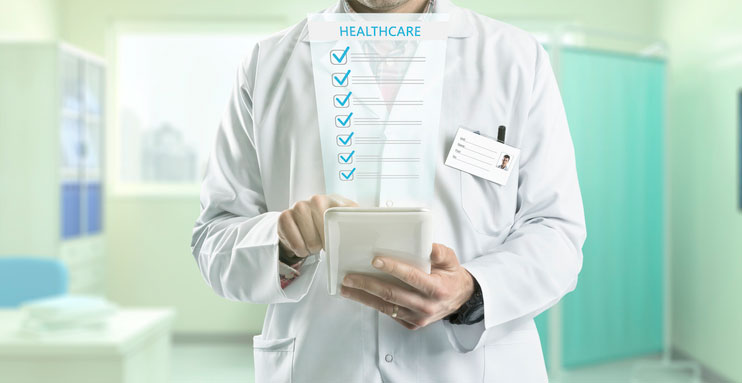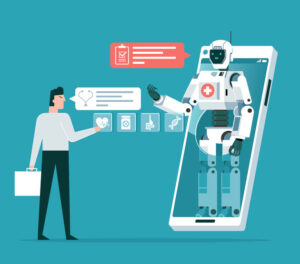Written by Scott Wilson

If you want to see one revolution stacked on top of another, you don’t have to look any further than the field of medical informatics.
In a field as dependent on the clear and accurate transmission of vital information as medicine is, the invention of the computer was viewed with both hope and fear. The promise of consistency and accuracy fought with complexity and the fear of programming error.
But like every other industry, computers came to healthcare in a big way. Over the past few decades, the vast amount of information they came to store was slowly unlocked by revolutions in the field of data science.
Machine learning algorithms, fast databases, and new visualization techniques have led to amazing advances in interchangeable record formats, decision support tools, and clinical research advances.





Now, artificial intelligence is going to take what data science has already started in healthcare and nursing informatics and turbocharge it. But the fear and hope remain—and only highly skilled artificial intelligence engineers can overcome it.
What Is Medical Informatics?
 Medical informatics is all about storing and making sense of the data that hospitals and clinics collect every day.
Medical informatics is all about storing and making sense of the data that hospitals and clinics collect every day.
Clinicians have long since practiced intensive data collection. Differential diagnosis demands it; patient histories hold hidden clues that can reveal disease or suggest treatments.
The ability that AI brings to health informatics puts evidence-based medicine in the spotlight.
All these capabilities, though, fall down in the deluge of information coming at them. According to RBC, around 30 percent of all data volume generated in the world today comes from the healthcare industry. By 2025, the rate of compound growth of that information will hit 36 percent. Newer, smarter systems are needed to assess and manage that data.
At first blush, nursing might seem like the least likely of healthcare fields to adopt artificial intelligence. As the clinical approach that is known for focusing most on the holistic, humanistic, quality-of-life approach for each patient, the cold rationale of machine logic might be expected to get a cold shoulder from nurses.
But technology and humanity aren’t at odds. Nurses have long taken advantage of technologies that help advance their mission. And with a newly relatable, more understandable injection of language skills from generative AI and natural language processing breakthroughs, AI is in a place where it can make a big difference in nursing informatics.
How AI Will Transform the Field of Healthcare Informatics
 Much of what AI will be used for initially in informatics will essentially be putting data science on steroids.
Much of what AI will be used for initially in informatics will essentially be putting data science on steroids.
AI tools will do a faster, smarter job of evaluating patient records for inconsistencies and flagging potential risks and treatments without a clinician ever having to look at a chart. Moreover, it can do so over wide swaths of different populations, leveraging the data from many to improve treatments for individuals.
There’s also a lot of room for improvement and assistance in the baffling world of medical billing. AI tools can help ensure proper documentation and coding have occurred to reduce rejections and follow-up in reimbursement.
AI is also finding roles in treatment. Projects are reviewing patient records to make recommendations on how long they should remain in the hospital after certain procedures; the Google Cloud Healthcare API can suggest ways to reduce readmissions, and the company is introducing AI-powered search to reduce the time clinicians have to spend looking for relevant information in electronic healthcare records (EHR).
AI may play a bigger role in patient engagement in the future, as well. With the natural language processing abilities of generative AI chatbots, healthcare systems are looking at using those systems as screeners for initial patient contact. They may be able to flag signs and symptoms without bogging a nurse down in evaluations… and they can do it in any language, automatically translated instantly and fluently to the patient’s native tongue.
Similarly, they can be used for follow-up and reminders. These are all simple processes that nursing professionals have long since known can make huge differences in outcomes. But with the coming shortages of nurses and other clinicians, such critical procedures might fall by the wayside without AI.
Looking at the Jobs Likely to Develop Around Artificial Intelligence in Medical Informatics
Positions for AI professionals in healthcare informatics will run the spectrum:
- AI engineers to develop practical systems for managing and accessing healthcare information
- AI researchers to explore connections in healthcare data
- AI trainers to shape NLP systems that will interact with staff or patients
- AI developers to integrate existing medical informatics systems with new AI capabilities
These will often be found at major hospitals and healthcare systems, as well as health insurance companies. Unlike other AI jobs, there is also likely to be a lot of government roles for AI professionals in informatics at the state, local, and federal level. With both oversight and population health responsibilities, government will need to stay on top of the new developments in AI informatics.
While many of the positions in informatics go to staff with clinical skills, like nurses, there are also specialists in informatics itself who come from a more specialized background. Artificial intelligence jobs are likely to weave together with those dedicated positions in new hybrid positions that integrate AI, data science, and healthcare knowledge.
What Are the Best Degrees for AI Professionals Exploring Nursing and Healthcare Informatics Roles?
 Both artificial intelligence and healthcare are fields where education is highly valued. So degree requirements for working at their intersection are understandably high.
Both artificial intelligence and healthcare are fields where education is highly valued. So degree requirements for working at their intersection are understandably high.
In almost every case, that’s going to mean a master’s or doctoral degree. While some people come at AI development in health informatics from the clinical side, having already earned their MD or DNP, anyone who is still working their way through the pipeline has the option of going into a rigorous dual degree program that combines MD or MSN studies with a Master of Science in Artificial Intelligence.
More directly aligned with the informatics role are degrees like the Master of Science in Health Care Analytics and Information Technology. Like other degrees in computer science, these are starting to lean in to the new developments in AI and ML. Applying AI to electronic health records for early detection and intervention is a big focus in the field.
In many cases, all you’ll need is something along the lines of a Graduate Certificate in Healthcare AI. With only a handful of classes, these aren’t as intensive as going through a full degree. But they are far faster and less expensive, too. Building on your existing experience and expertise, they can walk you through specific skills and knowledge including:
- Data Preparation and Analysis
- Machine Learning for Healthcare
- Data Analytics and Visualization
Since they are so short, you do need to make sure the contents of educational certificate programs lines up with the kind of work you want to do in healthcare AI. Some certificates focus on areas like computer vision, or robotics, rather than data science. A Certificate in Medical Imaging Informatics is one example. But the titles aren’t always clear, so you’ll want to check the coursework for details.
Professional Certification Can Help Along Your Career in Both AI and Health Informatics
 Professional certifications are a big deal in both healthcare and information technology. So it stands to reason that certs will be a big deal as AI roles into informatics as well.
Professional certifications are a big deal in both healthcare and information technology. So it stands to reason that certs will be a big deal as AI roles into informatics as well.
Certification is different from educational certificates in that it validates your skills and knowledge rather than teaching them to you. While educational certificates come from colleges, professional certifications are usually offered by independent industry groups or vendors.
AMIA, the American Medical Informatics Association, already offers board certification in health informatics. AHIC, the AMIA Health Informatics Certification, is open to professionals with a combination of advanced degrees and extensive experience working in the field. Like most certifications, a rigorous exam has to be passed as well.
There are also a range of certifications that are specific to clinicians, like the ACHIP, or AMIA Clinical Health Informatics Certification, or the Nursing Informatics – Board Certified credential from the American Nurses Credentialing Center.
AI professionals have their own range of certification options, although not specific to healthcare informatics. But depending on your role, any one of a number of existing professional AI certifications can boost your career and expertise.
The amount of data coming out of the healthcare industry isn’t slowing down, and the number of patients and therapies are only increasing. Specializing in AI for healthcare informatics is a good way to put yourself on the fast track at the intersection of two of the most in-demand fields for the 21st century.




